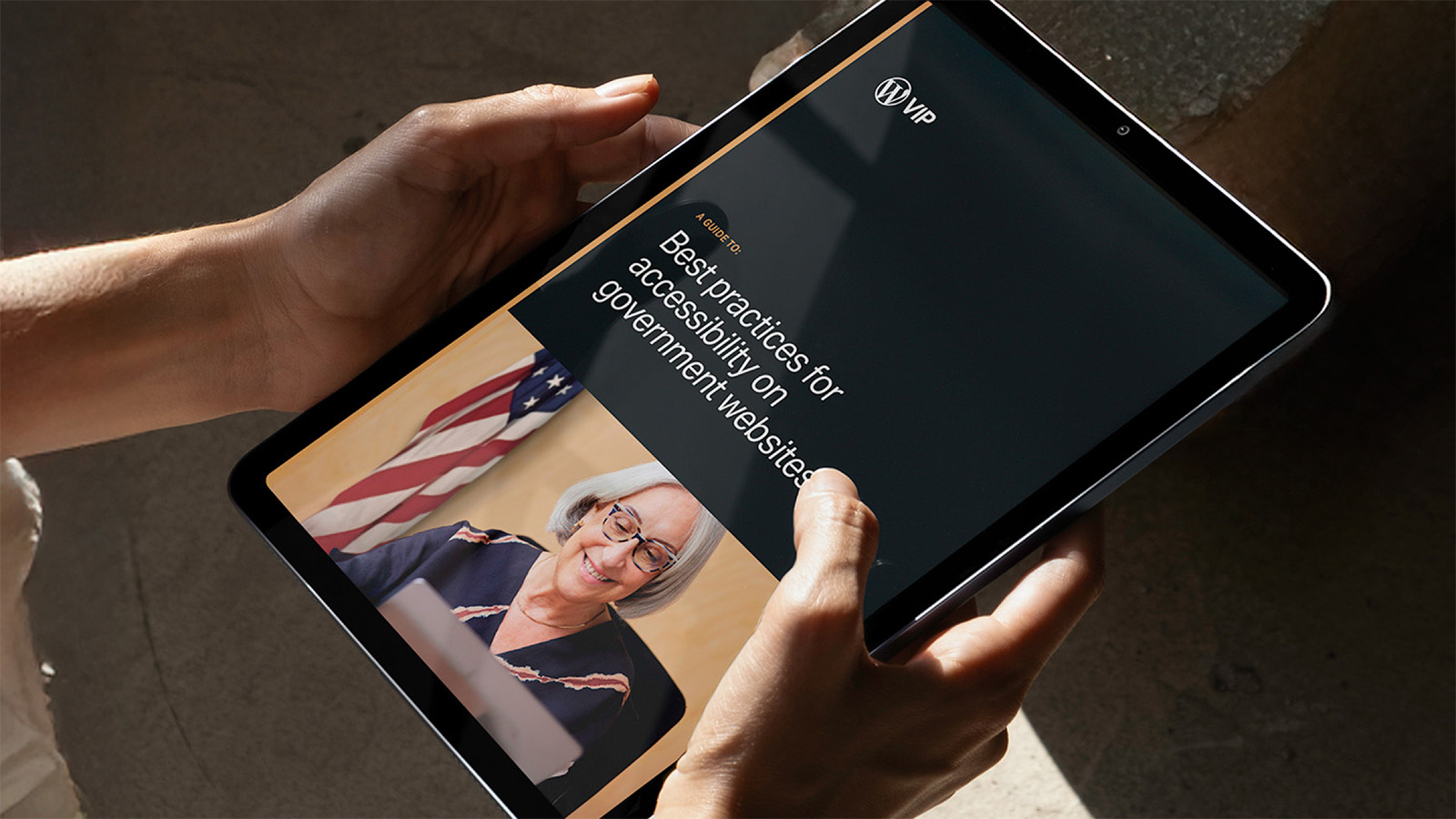For state and local government websites, this is more than a compliance checkbox. It’s a mandate to guarantee equitable access for every citizen. Non-compliance risks not only legal penalties but also an erosion of public trust.
Navigating this transition requires the right expertise and a modern platform. WordPress VIP delivers both, ensuring state and local governments can confidently meet the required WCAG 2.1 Level AA standard while also providing full support for WCAG 2.2 best practices.
What’s changing in April 2026?
Since its inception, the ADA has required public accommodations to be accessible. However, as digital services increasingly replace face‑to‑face interactions, the law has struggled to keep pace — until now.
In April 2024, the U.S. Department of Justice finalized a major update to Title II of the ADA, requiring state and local government digital services to meet WCAG 2.1 Level AA standards.
Starting April 24, 2026, state and local governments with a population of 50,000 or more must ensure that websites and mobile applications comply with WCAG 2.1 Level AA. Special district governments and state and local governments with a population of less than 50,000 must meet these requirements by April 26, 2027 (source: ADA’s First Steps towards compliance).
This means digital content must be perceivable, operable, understandable, and robust for people with disabilities — whether they use a screen reader, keyboard navigation, or other assistive technology.
This new rule applies to:
- State and local government websites.
- Mobile applications developed by or for public entities.
- Public-facing forms, portals, and digital documents.
The goal is to ensure full and equal access to essential digital services, such as applying for benefits, accessing public health information, or scheduling municipal services.
What happens if compliance isn’t met?
Failure to meet WCAG 2.1 Level AA standards may expose agencies to:
- Civil lawsuits brought by individuals with disabilities or advocacy organizations.
- Consent decrees or settlement agreements requiring remediation under strict timelines.
- Increased costs due to rushed fixes, legal defense, or duplicated content work.
- Loss of public trust, especially if essential services are inaccessible.
- Federal enforcement from the DOJ.
This is not a theoretical risk. The DOJ has already brought enforcement actions against public agencies for digital inaccessibility, and private litigation under the ADA continues to rise. Waiting until 2026, or reacting only after a complaint, is likely to cost more than acting proactively now.
For full details, see the DOJ Final Rule on Web Accessibility under Title II of the ADA (Federal Register, April 24, 2024).
Why this matters
“Only two percent of forms are digitized… Sixty percent of websites are not fully usable by those who use assistive technologies… This is unacceptable. We can and must do better.”
— The White House, 2023
Digital accessibility is not just about meeting legal standards; it’s about equity. Millions of Americans rely on accessible websites to engage with government services. For public sector digital and IT teams, the April 2026 deadline presents an urgent opportunity to update legacy systems and design with inclusion in mind.
Understanding WCAG 2.2
The Web Content Accessibility Guidelines (WCAG) are the international benchmark for web accessibility. While WCAG 2.1 Level AA is the required standard adopted by the DoJ in their ruling, version 2.2 is the most recent revision of the standard. Newer versions like 2.2 are not automatically incorporated into the DOJ’s rule, but meeting them can improve usability for a broader range of users.
Building on its predecessor, version 2.2 is fully compatible with 2.1 and introduces new success criteria aimed at:
- Improving navigation for users with cognitive disabilities.
- Enhancing support for users on mobile and touch devices.
- Making interactive elements (like buttons and forms) more inclusive.
By April 2026, all public sector digital services will be evaluated against WCAG 2.1 Level AA. WCAG 2.2 compliance will ensure you meet the requirements of this ruling and know you’re following the best standards for ensuring site accessibility.
WordPress VIP not only meets WCAG 2.1 Level AA requirements but also supports WCAG 2.2, enabling public sector teams to go beyond compliance and follow the latest best practices.
Who needs to act? And how?
If you work in public sector IT, digital services, or communications, these changes affect your roadmap immediately. Common steps to prepare include:
- Performing a comprehensive accessibility audit of all digital properties.
- Reviewing and updating CMS templates and themes to support WCAG 2.1 or later.
- Ensuring PDFs and embedded documents meet accessibility standards.
- Training internal teams and external vendors in accessible design and content practices.
Want to see how your current site measures up? Run it through our free Website Performance Scanner to get instant insights on accessibility, speed, and overall readiness for the April 2026 mandate.
How WordPress VIP can help
Whether you manage 5 websites or 500, WordPress VIP enables you to build secure, scalable, and accessible digital experiences — without needing to assemble multiple tools.
Our platform offers:
- Full support for WCAG 2.2 and Section 508 Compliance.
- An integrated suite combining accessibility, performance, and usability features.
- FedRAMP Moderate Authorization.
Spotlight: leading organizations modernizing for accessibility
“Modernizing our main websites and streamlining how the public engages with our content online are critical first steps in making our agency’s information more accessible…”
— NASA Digital Modernization Team
From the redesign of NASA.gov to the Ford Foundation’s inclusive website launch, public-serving organizations are setting the standard for modern, accessible design using WordPress VIP.
April 2026 is closer than you think
Waiting to achieve compliance isn’t an option. Our public sector specialists are here to help you prepare for the April 2026 mandates and build digital experiences that serve every constituent.
Request a demo to talk through your accessibility goals, compliance challenges, and modernization roadmap.
Talk to our team
Fill out the form to schedule your demo call

Rebecca Allen
Public Sector Marketer, WordPress VIP
